 In the contemporary discussions regarding post-colonial Europe, the concepts of memory and post- memory have taken on growing importance, giving prominence to an insight with great political relevance: colonialism never ends with those who enforced or suffered it. Traces of a colonial mindset impregnate generations to come and it has been passed down through the image of the former coloniser and the former colonised. These characters restage a complex phantasmagoria closely related to the most intimate ghost of the European subconscious: its colonial ghost which manifests itself inter alia in the form of a colonial “transfer of memory” – as racism, segregation, exclusion, subalternity – or in the form of “eruptions of memory”, and thereby questions the very essence of European multicultural societies, shaped by colonial heritage and fed by waves of migration.
In the contemporary discussions regarding post-colonial Europe, the concepts of memory and post- memory have taken on growing importance, giving prominence to an insight with great political relevance: colonialism never ends with those who enforced or suffered it. Traces of a colonial mindset impregnate generations to come and it has been passed down through the image of the former coloniser and the former colonised. These characters restage a complex phantasmagoria closely related to the most intimate ghost of the European subconscious: its colonial ghost which manifests itself inter alia in the form of a colonial “transfer of memory” – as racism, segregation, exclusion, subalternity – or in the form of “eruptions of memory”, and thereby questions the very essence of European multicultural societies, shaped by colonial heritage and fed by waves of migration.
31.10.2021 | by Margarida Calafate Ribeiro
 The exhibition Europa Oxalá is also the ideal time to deconstruct the colonial myth and the post-colonial melancholy designated as “African art”. Attributed to all artistic production that originates in the African continent, the expression has been used to differentiate it in a coarse way from all the art included in the compendiums and narratives of the universal history of art founded in the Western matrix. So-called African art was seen as an art without authorship, disconnected from the diversity of its production contexts, be they a country of North Africa, of the South or the east or west coast, be it the 14th or 20th century.
The exhibition Europa Oxalá is also the ideal time to deconstruct the colonial myth and the post-colonial melancholy designated as “African art”. Attributed to all artistic production that originates in the African continent, the expression has been used to differentiate it in a coarse way from all the art included in the compendiums and narratives of the universal history of art founded in the Western matrix. So-called African art was seen as an art without authorship, disconnected from the diversity of its production contexts, be they a country of North Africa, of the South or the east or west coast, be it the 14th or 20th century.
18.10.2021 | by António Pinto Ribeiro
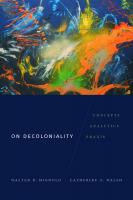 There is no Afro-Brazilian art student I have met who is not enthusiastic about Mbembe’s thoughts. This is definitely a good sign; an expression of the growing debate about racism, hidden for too long in Brazil. The current political situation does not leave space anymore for denial. It is also a reflection of two factors: firstly, the complexity of the relation between decoloniality and globalisation in the South; and secondly, the relation between publishing policies and the circulation of critical thought.
There is no Afro-Brazilian art student I have met who is not enthusiastic about Mbembe’s thoughts. This is definitely a good sign; an expression of the growing debate about racism, hidden for too long in Brazil. The current political situation does not leave space anymore for denial. It is also a reflection of two factors: firstly, the complexity of the relation between decoloniality and globalisation in the South; and secondly, the relation between publishing policies and the circulation of critical thought.
07.09.2021 | by Laura Burocco
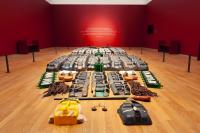 Rather than perceiving a national museum as a mere repository of cultural artefacts emblematic of either the elite’s values or its fetishization of those it excludes and rejects, the curators of Slavery have fully embraced their educational responsibility and their duty to actively contribute to cultural life in the present. All of which cannot prevent a feeling from remaining, that the fires of purgatory still rage on and much must yet be done to extinguish them.
Rather than perceiving a national museum as a mere repository of cultural artefacts emblematic of either the elite’s values or its fetishization of those it excludes and rejects, the curators of Slavery have fully embraced their educational responsibility and their duty to actively contribute to cultural life in the present. All of which cannot prevent a feeling from remaining, that the fires of purgatory still rage on and much must yet be done to extinguish them.
15.08.2021 | by Paulo de Medeiros
 Though based in Amsterdam, Lyuba has made work all over the world – from Japan to Aruba – at art residencies or as a visiting teacher. Wherever she goes, she researches the myths and tales told in that place as inspiration for the characters she builds and the masks they wear. Lyuba is fascinated by Joseph Campbell’s theory of artists as shamans who create the myths that reflect our reality. “Shamans use masks to travel to different realities, to travel to different worlds,” she says, “And in a way I do the same through my artwork.”
Though based in Amsterdam, Lyuba has made work all over the world – from Japan to Aruba – at art residencies or as a visiting teacher. Wherever she goes, she researches the myths and tales told in that place as inspiration for the characters she builds and the masks they wear. Lyuba is fascinated by Joseph Campbell’s theory of artists as shamans who create the myths that reflect our reality. “Shamans use masks to travel to different realities, to travel to different worlds,” she says, “And in a way I do the same through my artwork.”
18.06.2021 | by Lyubov Matyunina and Alix-Rose Cowie
 He titles all of his works Bug Report, named after the message you might see on a computer screen to tell you about program errors or defects. No matter how complex and polished his diagrams and blueprints might seem, he wants to make it clear that they can still be flawed and faulty. “In any highly controlled system, it can hardly be said that there is no possibility of an error,” he says. “There are always some questions around security in this seemingly complete world. In my drawings, the thread is a material symbolizing the imperfect structure of society.”
He titles all of his works Bug Report, named after the message you might see on a computer screen to tell you about program errors or defects. No matter how complex and polished his diagrams and blueprints might seem, he wants to make it clear that they can still be flawed and faulty. “In any highly controlled system, it can hardly be said that there is no possibility of an error,” he says. “There are always some questions around security in this seemingly complete world. In my drawings, the thread is a material symbolizing the imperfect structure of society.”
17.06.2021 | by Keita Mori and Alex Kahl
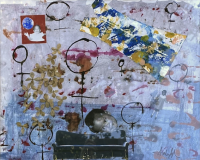 This article demonstrates that antifeminist agendas (often labelled as anti-gender ideology by proponents) are key to understand how ethnonationalist, xenophobic and racist discourses are forwarded by far-right parties in Portugal and across Europe. Therefore, it focuses on the intersections between antifeminism, including femonationalism, and anti-immigration agendas, examining how gendered and racialized tropes are used in conjunction in far-right propaganda.
This article demonstrates that antifeminist agendas (often labelled as anti-gender ideology by proponents) are key to understand how ethnonationalist, xenophobic and racist discourses are forwarded by far-right parties in Portugal and across Europe. Therefore, it focuses on the intersections between antifeminism, including femonationalism, and anti-immigration agendas, examining how gendered and racialized tropes are used in conjunction in far-right propaganda.
19.05.2021 | by Rita Santos and Sílvia Roque
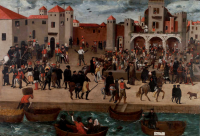 Today, we are learning that invisibility can shun and silence but cannot extinguish. And yes, colonialism can be unlearned; but to do so, it must first be confronted. Colonial amnesia is a political disease – and one for which we have yet to find a cure. Unlike the words uttered by Bruno Candé’s murderer, there are no more senzalas to return to. But, aligned with the theme of reckoning that brought us here today, to unlearn and decolonize, the past must be confronted. One way to start, would entail acknowledging the intersectionality of race-making and forge a vision of collective life not ruled by marked hierarchies.
Today, we are learning that invisibility can shun and silence but cannot extinguish. And yes, colonialism can be unlearned; but to do so, it must first be confronted. Colonial amnesia is a political disease – and one for which we have yet to find a cure. Unlike the words uttered by Bruno Candé’s murderer, there are no more senzalas to return to. But, aligned with the theme of reckoning that brought us here today, to unlearn and decolonize, the past must be confronted. One way to start, would entail acknowledging the intersectionality of race-making and forge a vision of collective life not ruled by marked hierarchies.
01.04.2021 | by Patrícia Martins Marcos
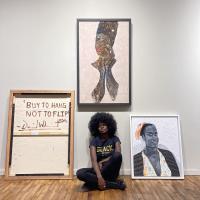 Some say the appreciation of Black art is a trend, but Black art in itself is no more a trend than “white art.” It’s part of world culture, of art history, and history is being made every day. Black art should be appreciated for its contribution to humanity and history. Black people have always collected Black art, appreciated it, and cherished it, even when it received little recognition, as acknowledged in the new HBO documentary Black Art: In the Absence of Light.
Some say the appreciation of Black art is a trend, but Black art in itself is no more a trend than “white art.” It’s part of world culture, of art history, and history is being made every day. Black art should be appreciated for its contribution to humanity and history. Black people have always collected Black art, appreciated it, and cherished it, even when it received little recognition, as acknowledged in the new HBO documentary Black Art: In the Absence of Light.
19.03.2021 | by Destinee Ross-Sutton
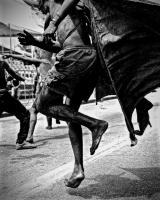 There is a present-day tendency to retreat into the realms of dystopia, of catastrophe and disaster, of failed states and fascism, of environmental collapse and economic apocalypse. This tendency is neither wrong nor mistaken. Yet it is often suffocating, only adding to the pressurized dread of the era, offering no antidote to the plague of cynicism, the chokehold of hopelessness, the drift, or, perhaps, the plunge, into a miasma of pessimism and hopelessness. Of course, there are other tendencies, other possibilities, other ways forward. Here, we briefly mention five recent books, loosely grouped under the banners of anarchism, autonomy, and utopia, that propose better worlds to come – as better must come.
There is a present-day tendency to retreat into the realms of dystopia, of catastrophe and disaster, of failed states and fascism, of environmental collapse and economic apocalypse. This tendency is neither wrong nor mistaken. Yet it is often suffocating, only adding to the pressurized dread of the era, offering no antidote to the plague of cynicism, the chokehold of hopelessness, the drift, or, perhaps, the plunge, into a miasma of pessimism and hopelessness. Of course, there are other tendencies, other possibilities, other ways forward. Here, we briefly mention five recent books, loosely grouped under the banners of anarchism, autonomy, and utopia, that propose better worlds to come – as better must come.
18.03.2021 | by The Public Archive
 The events of the past six years have sharpened Gilroy's observations. At the same time, they have made it increasingly clear that, despite the real progress achieved, attempts to maintain privileges based on structural and systemic inequality, whether in terms of class, gender or race, have become even more obstinate. Attempts that go hand in hand with the futile but devastating efforts to deny history and impose the erasure of memory.
The events of the past six years have sharpened Gilroy's observations. At the same time, they have made it increasingly clear that, despite the real progress achieved, attempts to maintain privileges based on structural and systemic inequality, whether in terms of class, gender or race, have become even more obstinate. Attempts that go hand in hand with the futile but devastating efforts to deny history and impose the erasure of memory.
18.02.2021 | by Paulo de Medeiros
 Black historic and political figures have been rendered as vanquishing heroes as well. Noble, brave and transcendent, they have remarkable stories. We tremble in awe before the recounting of Frederick Douglass escaping from slavery and Ida B. Wells narrowly evading the Klan in Memphis, saving her own life — then, through her investigative journalism into the practice of lynching, saving the lives of countless others. Martin Luther King Jr., who survived threats, bombs and jail cells before falling to an assassin’s bullets, has been rendered as the ultimate hero. His depiction is messianic. And though he was a key member of a vast and complex movement, he is often presented as singular. This is the way we tell history in the American public sphere.
Black historic and political figures have been rendered as vanquishing heroes as well. Noble, brave and transcendent, they have remarkable stories. We tremble in awe before the recounting of Frederick Douglass escaping from slavery and Ida B. Wells narrowly evading the Klan in Memphis, saving her own life — then, through her investigative journalism into the practice of lynching, saving the lives of countless others. Martin Luther King Jr., who survived threats, bombs and jail cells before falling to an assassin’s bullets, has been rendered as the ultimate hero. His depiction is messianic. And though he was a key member of a vast and complex movement, he is often presented as singular. This is the way we tell history in the American public sphere.
05.02.2021 | by Imani Perry
 On June 30, 1960, at the ceremony for the proclamation of independence of the Congo, there were three speeches: from King Baudouin of Belgium, the former colonizing power, the President of the Congo, Joseph Kasavubu, and Patrice Lumumba, Prime Minister, the latter in an intervention not foreseen in the initial protocol. It was a short speech of about twelve minutes, written in an accessible and incisive language, performative and visual, a speech that, as the historian Jean Omasombo Tshonda defends, "founds the independent Congo". The first eight minutes are the clearest definition of what colonialism is from the point of view of a continent, a country, a community, a person.
On June 30, 1960, at the ceremony for the proclamation of independence of the Congo, there were three speeches: from King Baudouin of Belgium, the former colonizing power, the President of the Congo, Joseph Kasavubu, and Patrice Lumumba, Prime Minister, the latter in an intervention not foreseen in the initial protocol. It was a short speech of about twelve minutes, written in an accessible and incisive language, performative and visual, a speech that, as the historian Jean Omasombo Tshonda defends, "founds the independent Congo". The first eight minutes are the clearest definition of what colonialism is from the point of view of a continent, a country, a community, a person.
01.02.2021 | by Margarida Calafate Ribeiro
 Guardians put themselves on the line to defend the ideals sacred to democracy. In 2020, they fought on many fronts. When George Floyd was killed in Minneapolis in May, it was proof—if anyone needed it—that Black lives are still not treated as equal in America. In the aftermath of his death, a wave of outrage surged and was harnessed by organizers, both veteran and newly energized, to bring millions to the streets and spotlight the inequities in a world that claims to be far better than it is. The movement for racial justice found its voice in multitudes: a mother in Kenosha delivering her frank report to Joe Biden; a sister in Paris calling for police accountability in her brother’s death. In this extraordinary year, they guarded truth—lived truth.
Guardians put themselves on the line to defend the ideals sacred to democracy. In 2020, they fought on many fronts. When George Floyd was killed in Minneapolis in May, it was proof—if anyone needed it—that Black lives are still not treated as equal in America. In the aftermath of his death, a wave of outrage surged and was harnessed by organizers, both veteran and newly energized, to bring millions to the streets and spotlight the inequities in a world that claims to be far better than it is. The movement for racial justice found its voice in multitudes: a mother in Kenosha delivering her frank report to Joe Biden; a sister in Paris calling for police accountability in her brother’s death. In this extraordinary year, they guarded truth—lived truth.
29.12.2020 | by Justin Worland
 In the face of this new narrative that acknowledges artistic production and an appreciation of it by African communities, how do secular cultural traditions of African countries interact today with artistic training and production, in the case of Afrodescendant artists, who were born and raised in European countries? How do events in the history of Africa and Africans combine with the artistic languages of the "European schools" and, in particular, with contemporary themes?
In the face of this new narrative that acknowledges artistic production and an appreciation of it by African communities, how do secular cultural traditions of African countries interact today with artistic training and production, in the case of Afrodescendant artists, who were born and raised in European countries? How do events in the history of Africa and Africans combine with the artistic languages of the "European schools" and, in particular, with contemporary themes?
28.12.2020 | by António Pinto Ribeiro
 My own difficult experience teaching literature bears this out. Students’ response to every African story is that “the white man stole our culture, we are ashamed of our identity and need to return to our cultures”. But even as they limit colonialism to an exclusively cultural enterprise, they are not able to connect with stories of the past to which they say we should return to.
My own difficult experience teaching literature bears this out. Students’ response to every African story is that “the white man stole our culture, we are ashamed of our identity and need to return to our cultures”. But even as they limit colonialism to an exclusively cultural enterprise, they are not able to connect with stories of the past to which they say we should return to.
22.12.2020 | by Wandia Njoya
 What I seek in these encounters with overseas veterans is something I am unable to translate into a simple, telegraphic formula. Among these veterans there is a very strong sense of community, an almost familiar, almost tribal communion, which at certain times seems to me incompatible with a broader sense of community. It is a communion that tends to exclude me and all those who have not shared the same experience. What I seek in these conversations are the moments, similar to epiphanies, when veterans express belonging to a larger, more comprehensive human community, necessarily organized around moral values.
What I seek in these encounters with overseas veterans is something I am unable to translate into a simple, telegraphic formula. Among these veterans there is a very strong sense of community, an almost familiar, almost tribal communion, which at certain times seems to me incompatible with a broader sense of community. It is a communion that tends to exclude me and all those who have not shared the same experience. What I seek in these conversations are the moments, similar to epiphanies, when veterans express belonging to a larger, more comprehensive human community, necessarily organized around moral values.
13.12.2020 | by Paulo Faria
 As Black Lives Matter, we recognize and affirm the sanctity of all Black lives everywhere in the world. Following the murder of an unarmed civilian by the Special Anti-Robbery Squad (SARS) unit of the Nigerian police, young people across Nigeria have held protests denouncing years of brutality, torture, abductions, and killings. The demonstrations mark one of the largest Nigerian protest movements in generations. (...) There is a global movement for Black lives afoot. From the protestors in Cameroon who faced down water cannon and tear gas, to the fierce women in Namibia demanding #Shutitalldown, to the brave Zimbabweans campaigning for the release of Takudzwa Ngadziore, we will not be silenced and we cannot be stopped. The call for Black lives to matter is a rallying cry for all Black lives striving for liberation. We stand against all violence inflicted on black communities.
As Black Lives Matter, we recognize and affirm the sanctity of all Black lives everywhere in the world. Following the murder of an unarmed civilian by the Special Anti-Robbery Squad (SARS) unit of the Nigerian police, young people across Nigeria have held protests denouncing years of brutality, torture, abductions, and killings. The demonstrations mark one of the largest Nigerian protest movements in generations. (...) There is a global movement for Black lives afoot. From the protestors in Cameroon who faced down water cannon and tear gas, to the fierce women in Namibia demanding #Shutitalldown, to the brave Zimbabweans campaigning for the release of Takudzwa Ngadziore, we will not be silenced and we cannot be stopped. The call for Black lives to matter is a rallying cry for all Black lives striving for liberation. We stand against all violence inflicted on black communities.
04.11.2020 | by BLM
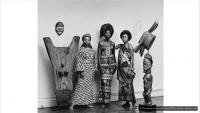 How a photographer, a group of models and a fashion show in Harlem kick-started a cultural and political movement that still inspires today. On 28 January 1962, a large crowd formed outside Purple Manor, a nightclub in the Harlem neighbourhood of New York City. A fashion show was taking place – an event that proved so popular it had to be held for a second time that same night – which sparked a movement that would change the way black people were represented forever. The show, titled Naturally ’62, was organised by the African Jazz-Art Society & Studios (AJASS), a group of creatives, including photographer Kwame Brathwaite.
How a photographer, a group of models and a fashion show in Harlem kick-started a cultural and political movement that still inspires today. On 28 January 1962, a large crowd formed outside Purple Manor, a nightclub in the Harlem neighbourhood of New York City. A fashion show was taking place – an event that proved so popular it had to be held for a second time that same night – which sparked a movement that would change the way black people were represented forever. The show, titled Naturally ’62, was organised by the African Jazz-Art Society & Studios (AJASS), a group of creatives, including photographer Kwame Brathwaite.
28.10.2020 | by Precious Adesina
 Throughout the nationwide upheaval set in motion by the police killing of George Floyd, in Minneapolis, on May 25th, Trump has vilified demonstrators as nefarious insurrectionists. Much as adversaries of the civil-rights movement once contended that it had been infiltrated by Communists, he invokes antifascists, or Antifa, to delegitimatize Black Lives Matter. A week after Floyd’s death, as popular uprisings spread from Minneapolis to other cities, the President declared, “Our nation has been gripped by professional anarchists, violent mobs, arsonists, looters, criminals, rioters, Antifa, and others.”
Throughout the nationwide upheaval set in motion by the police killing of George Floyd, in Minneapolis, on May 25th, Trump has vilified demonstrators as nefarious insurrectionists. Much as adversaries of the civil-rights movement once contended that it had been infiltrated by Communists, he invokes antifascists, or Antifa, to delegitimatize Black Lives Matter. A week after Floyd’s death, as popular uprisings spread from Minneapolis to other cities, the President declared, “Our nation has been gripped by professional anarchists, violent mobs, arsonists, looters, criminals, rioters, Antifa, and others.”
28.10.2020 | by Luke Mogelson
 In the contemporary discussions regarding post-colonial Europe, the concepts of memory and post- memory have taken on growing importance, giving prominence to an insight with great political relevance: colonialism never ends with those who enforced or suffered it. Traces of a colonial mindset impregnate generations to come and it has been passed down through the image of the former coloniser and the former colonised. These characters restage a complex phantasmagoria closely related to the most intimate ghost of the European subconscious: its colonial ghost which manifests itself inter alia in the form of a colonial “transfer of memory” – as racism, segregation, exclusion, subalternity – or in the form of “eruptions of memory”, and thereby questions the very essence of European multicultural societies, shaped by colonial heritage and fed by waves of migration.
In the contemporary discussions regarding post-colonial Europe, the concepts of memory and post- memory have taken on growing importance, giving prominence to an insight with great political relevance: colonialism never ends with those who enforced or suffered it. Traces of a colonial mindset impregnate generations to come and it has been passed down through the image of the former coloniser and the former colonised. These characters restage a complex phantasmagoria closely related to the most intimate ghost of the European subconscious: its colonial ghost which manifests itself inter alia in the form of a colonial “transfer of memory” – as racism, segregation, exclusion, subalternity – or in the form of “eruptions of memory”, and thereby questions the very essence of European multicultural societies, shaped by colonial heritage and fed by waves of migration.  The exhibition Europa Oxalá is also the ideal time to deconstruct the colonial myth and the post-colonial melancholy designated as “African art”. Attributed to all artistic production that originates in the African continent, the expression has been used to differentiate it in a coarse way from all the art included in the compendiums and narratives of the universal history of art founded in the Western matrix. So-called African art was seen as an art without authorship, disconnected from the diversity of its production contexts, be they a country of North Africa, of the South or the east or west coast, be it the 14th or 20th century.
The exhibition Europa Oxalá is also the ideal time to deconstruct the colonial myth and the post-colonial melancholy designated as “African art”. Attributed to all artistic production that originates in the African continent, the expression has been used to differentiate it in a coarse way from all the art included in the compendiums and narratives of the universal history of art founded in the Western matrix. So-called African art was seen as an art without authorship, disconnected from the diversity of its production contexts, be they a country of North Africa, of the South or the east or west coast, be it the 14th or 20th century.  There is no Afro-Brazilian art student I have met who is not enthusiastic about Mbembe’s thoughts. This is definitely a good sign; an expression of the growing debate about racism, hidden for too long in Brazil. The current political situation does not leave space anymore for denial. It is also a reflection of two factors: firstly, the complexity of the relation between decoloniality and globalisation in the South; and secondly, the relation between publishing policies and the circulation of critical thought.
There is no Afro-Brazilian art student I have met who is not enthusiastic about Mbembe’s thoughts. This is definitely a good sign; an expression of the growing debate about racism, hidden for too long in Brazil. The current political situation does not leave space anymore for denial. It is also a reflection of two factors: firstly, the complexity of the relation between decoloniality and globalisation in the South; and secondly, the relation between publishing policies and the circulation of critical thought.  Rather than perceiving a national museum as a mere repository of cultural artefacts emblematic of either the elite’s values or its fetishization of those it excludes and rejects, the curators of Slavery have fully embraced their educational responsibility and their duty to actively contribute to cultural life in the present. All of which cannot prevent a feeling from remaining, that the fires of purgatory still rage on and much must yet be done to extinguish them.
Rather than perceiving a national museum as a mere repository of cultural artefacts emblematic of either the elite’s values or its fetishization of those it excludes and rejects, the curators of Slavery have fully embraced their educational responsibility and their duty to actively contribute to cultural life in the present. All of which cannot prevent a feeling from remaining, that the fires of purgatory still rage on and much must yet be done to extinguish them.  Though based in Amsterdam, Lyuba has made work all over the world – from Japan to Aruba – at art residencies or as a visiting teacher. Wherever she goes, she researches the myths and tales told in that place as inspiration for the characters she builds and the masks they wear. Lyuba is fascinated by Joseph Campbell’s theory of artists as shamans who create the myths that reflect our reality. “Shamans use masks to travel to different realities, to travel to different worlds,” she says, “And in a way I do the same through my artwork.”
Though based in Amsterdam, Lyuba has made work all over the world – from Japan to Aruba – at art residencies or as a visiting teacher. Wherever she goes, she researches the myths and tales told in that place as inspiration for the characters she builds and the masks they wear. Lyuba is fascinated by Joseph Campbell’s theory of artists as shamans who create the myths that reflect our reality. “Shamans use masks to travel to different realities, to travel to different worlds,” she says, “And in a way I do the same through my artwork.”  He titles all of his works Bug Report, named after the message you might see on a computer screen to tell you about program errors or defects. No matter how complex and polished his diagrams and blueprints might seem, he wants to make it clear that they can still be flawed and faulty. “In any highly controlled system, it can hardly be said that there is no possibility of an error,” he says. “There are always some questions around security in this seemingly complete world. In my drawings, the thread is a material symbolizing the imperfect structure of society.”
He titles all of his works Bug Report, named after the message you might see on a computer screen to tell you about program errors or defects. No matter how complex and polished his diagrams and blueprints might seem, he wants to make it clear that they can still be flawed and faulty. “In any highly controlled system, it can hardly be said that there is no possibility of an error,” he says. “There are always some questions around security in this seemingly complete world. In my drawings, the thread is a material symbolizing the imperfect structure of society.”  This article demonstrates that antifeminist agendas (often labelled as anti-gender ideology by proponents) are key to understand how ethnonationalist, xenophobic and racist discourses are forwarded by far-right parties in Portugal and across Europe. Therefore, it focuses on the intersections between antifeminism, including femonationalism, and anti-immigration agendas, examining how gendered and racialized tropes are used in conjunction in far-right propaganda.
This article demonstrates that antifeminist agendas (often labelled as anti-gender ideology by proponents) are key to understand how ethnonationalist, xenophobic and racist discourses are forwarded by far-right parties in Portugal and across Europe. Therefore, it focuses on the intersections between antifeminism, including femonationalism, and anti-immigration agendas, examining how gendered and racialized tropes are used in conjunction in far-right propaganda.  Today, we are learning that invisibility can shun and silence but cannot extinguish. And yes, colonialism can be unlearned; but to do so, it must first be confronted. Colonial amnesia is a political disease – and one for which we have yet to find a cure. Unlike the words uttered by Bruno Candé’s murderer, there are no more senzalas to return to. But, aligned with the theme of reckoning that brought us here today, to unlearn and decolonize, the past must be confronted. One way to start, would entail acknowledging the intersectionality of race-making and forge a vision of collective life not ruled by marked hierarchies.
Today, we are learning that invisibility can shun and silence but cannot extinguish. And yes, colonialism can be unlearned; but to do so, it must first be confronted. Colonial amnesia is a political disease – and one for which we have yet to find a cure. Unlike the words uttered by Bruno Candé’s murderer, there are no more senzalas to return to. But, aligned with the theme of reckoning that brought us here today, to unlearn and decolonize, the past must be confronted. One way to start, would entail acknowledging the intersectionality of race-making and forge a vision of collective life not ruled by marked hierarchies.  Some say the appreciation of Black art is a trend, but Black art in itself is no more a trend than “white art.” It’s part of world culture, of art history, and history is being made every day. Black art should be appreciated for its contribution to humanity and history. Black people have always collected Black art, appreciated it, and cherished it, even when it received little recognition, as acknowledged in the new HBO documentary Black Art: In the Absence of Light.
Some say the appreciation of Black art is a trend, but Black art in itself is no more a trend than “white art.” It’s part of world culture, of art history, and history is being made every day. Black art should be appreciated for its contribution to humanity and history. Black people have always collected Black art, appreciated it, and cherished it, even when it received little recognition, as acknowledged in the new HBO documentary Black Art: In the Absence of Light.  There is a present-day tendency to retreat into the realms of dystopia, of catastrophe and disaster, of failed states and fascism, of environmental collapse and economic apocalypse. This tendency is neither wrong nor mistaken. Yet it is often suffocating, only adding to the pressurized dread of the era, offering no antidote to the plague of cynicism, the chokehold of hopelessness, the drift, or, perhaps, the plunge, into a miasma of pessimism and hopelessness. Of course, there are other tendencies, other possibilities, other ways forward. Here, we briefly mention five recent books, loosely grouped under the banners of anarchism, autonomy, and utopia, that propose better worlds to come – as better must come.
There is a present-day tendency to retreat into the realms of dystopia, of catastrophe and disaster, of failed states and fascism, of environmental collapse and economic apocalypse. This tendency is neither wrong nor mistaken. Yet it is often suffocating, only adding to the pressurized dread of the era, offering no antidote to the plague of cynicism, the chokehold of hopelessness, the drift, or, perhaps, the plunge, into a miasma of pessimism and hopelessness. Of course, there are other tendencies, other possibilities, other ways forward. Here, we briefly mention five recent books, loosely grouped under the banners of anarchism, autonomy, and utopia, that propose better worlds to come – as better must come.  The events of the past six years have sharpened Gilroy's observations. At the same time, they have made it increasingly clear that, despite the real progress achieved, attempts to maintain privileges based on structural and systemic inequality, whether in terms of class, gender or race, have become even more obstinate. Attempts that go hand in hand with the futile but devastating efforts to deny history and impose the erasure of memory.
The events of the past six years have sharpened Gilroy's observations. At the same time, they have made it increasingly clear that, despite the real progress achieved, attempts to maintain privileges based on structural and systemic inequality, whether in terms of class, gender or race, have become even more obstinate. Attempts that go hand in hand with the futile but devastating efforts to deny history and impose the erasure of memory.  Black historic and political figures have been rendered as vanquishing heroes as well. Noble, brave and transcendent, they have remarkable stories. We tremble in awe before the recounting of Frederick Douglass escaping from slavery and Ida B. Wells narrowly evading the Klan in Memphis, saving her own life — then, through her investigative journalism into the practice of lynching, saving the lives of countless others. Martin Luther King Jr., who survived threats, bombs and jail cells before falling to an assassin’s bullets, has been rendered as the ultimate hero. His depiction is messianic. And though he was a key member of a vast and complex movement, he is often presented as singular. This is the way we tell history in the American public sphere.
Black historic and political figures have been rendered as vanquishing heroes as well. Noble, brave and transcendent, they have remarkable stories. We tremble in awe before the recounting of Frederick Douglass escaping from slavery and Ida B. Wells narrowly evading the Klan in Memphis, saving her own life — then, through her investigative journalism into the practice of lynching, saving the lives of countless others. Martin Luther King Jr., who survived threats, bombs and jail cells before falling to an assassin’s bullets, has been rendered as the ultimate hero. His depiction is messianic. And though he was a key member of a vast and complex movement, he is often presented as singular. This is the way we tell history in the American public sphere.  On June 30, 1960, at the ceremony for the proclamation of independence of the Congo, there were three speeches: from King Baudouin of Belgium, the former colonizing power, the President of the Congo, Joseph Kasavubu, and Patrice Lumumba, Prime Minister, the latter in an intervention not foreseen in the initial protocol. It was a short speech of about twelve minutes, written in an accessible and incisive language, performative and visual, a speech that, as the historian Jean Omasombo Tshonda defends, "founds the independent Congo". The first eight minutes are the clearest definition of what colonialism is from the point of view of a continent, a country, a community, a person.
On June 30, 1960, at the ceremony for the proclamation of independence of the Congo, there were three speeches: from King Baudouin of Belgium, the former colonizing power, the President of the Congo, Joseph Kasavubu, and Patrice Lumumba, Prime Minister, the latter in an intervention not foreseen in the initial protocol. It was a short speech of about twelve minutes, written in an accessible and incisive language, performative and visual, a speech that, as the historian Jean Omasombo Tshonda defends, "founds the independent Congo". The first eight minutes are the clearest definition of what colonialism is from the point of view of a continent, a country, a community, a person.  Guardians put themselves on the line to defend the ideals sacred to democracy. In 2020, they fought on many fronts. When George Floyd was killed in Minneapolis in May, it was proof—if anyone needed it—that Black lives are still not treated as equal in America. In the aftermath of his death, a wave of outrage surged and was harnessed by organizers, both veteran and newly energized, to bring millions to the streets and spotlight the inequities in a world that claims to be far better than it is. The movement for racial justice found its voice in multitudes: a mother in Kenosha delivering her frank report to Joe Biden; a sister in Paris calling for police accountability in her brother’s death. In this extraordinary year, they guarded truth—lived truth.
Guardians put themselves on the line to defend the ideals sacred to democracy. In 2020, they fought on many fronts. When George Floyd was killed in Minneapolis in May, it was proof—if anyone needed it—that Black lives are still not treated as equal in America. In the aftermath of his death, a wave of outrage surged and was harnessed by organizers, both veteran and newly energized, to bring millions to the streets and spotlight the inequities in a world that claims to be far better than it is. The movement for racial justice found its voice in multitudes: a mother in Kenosha delivering her frank report to Joe Biden; a sister in Paris calling for police accountability in her brother’s death. In this extraordinary year, they guarded truth—lived truth.  In the face of this new narrative that acknowledges artistic production and an appreciation of it by African communities, how do secular cultural traditions of African countries interact today with artistic training and production, in the case of Afrodescendant artists, who were born and raised in European countries? How do events in the history of Africa and Africans combine with the artistic languages of the "European schools" and, in particular, with contemporary themes?
In the face of this new narrative that acknowledges artistic production and an appreciation of it by African communities, how do secular cultural traditions of African countries interact today with artistic training and production, in the case of Afrodescendant artists, who were born and raised in European countries? How do events in the history of Africa and Africans combine with the artistic languages of the "European schools" and, in particular, with contemporary themes?  My own difficult experience teaching literature bears this out. Students’ response to every African story is that “the white man stole our culture, we are ashamed of our identity and need to return to our cultures”. But even as they limit colonialism to an exclusively cultural enterprise, they are not able to connect with stories of the past to which they say we should return to.
My own difficult experience teaching literature bears this out. Students’ response to every African story is that “the white man stole our culture, we are ashamed of our identity and need to return to our cultures”. But even as they limit colonialism to an exclusively cultural enterprise, they are not able to connect with stories of the past to which they say we should return to.  What I seek in these encounters with overseas veterans is something I am unable to translate into a simple, telegraphic formula. Among these veterans there is a very strong sense of community, an almost familiar, almost tribal communion, which at certain times seems to me incompatible with a broader sense of community. It is a communion that tends to exclude me and all those who have not shared the same experience. What I seek in these conversations are the moments, similar to epiphanies, when veterans express belonging to a larger, more comprehensive human community, necessarily organized around moral values.
What I seek in these encounters with overseas veterans is something I am unable to translate into a simple, telegraphic formula. Among these veterans there is a very strong sense of community, an almost familiar, almost tribal communion, which at certain times seems to me incompatible with a broader sense of community. It is a communion that tends to exclude me and all those who have not shared the same experience. What I seek in these conversations are the moments, similar to epiphanies, when veterans express belonging to a larger, more comprehensive human community, necessarily organized around moral values.  As Black Lives Matter, we recognize and affirm the sanctity of all Black lives everywhere in the world. Following the murder of an unarmed civilian by the Special Anti-Robbery Squad (SARS) unit of the Nigerian police, young people across Nigeria have held protests denouncing years of brutality, torture, abductions, and killings. The demonstrations mark one of the largest Nigerian protest movements in generations. (...) There is a global movement for Black lives afoot. From the protestors in Cameroon who faced down water cannon and tear gas, to the fierce women in Namibia demanding #Shutitalldown, to the brave Zimbabweans campaigning for the release of Takudzwa Ngadziore, we will not be silenced and we cannot be stopped. The call for Black lives to matter is a rallying cry for all Black lives striving for liberation. We stand against all violence inflicted on black communities.
As Black Lives Matter, we recognize and affirm the sanctity of all Black lives everywhere in the world. Following the murder of an unarmed civilian by the Special Anti-Robbery Squad (SARS) unit of the Nigerian police, young people across Nigeria have held protests denouncing years of brutality, torture, abductions, and killings. The demonstrations mark one of the largest Nigerian protest movements in generations. (...) There is a global movement for Black lives afoot. From the protestors in Cameroon who faced down water cannon and tear gas, to the fierce women in Namibia demanding #Shutitalldown, to the brave Zimbabweans campaigning for the release of Takudzwa Ngadziore, we will not be silenced and we cannot be stopped. The call for Black lives to matter is a rallying cry for all Black lives striving for liberation. We stand against all violence inflicted on black communities.  How a photographer, a group of models and a fashion show in Harlem kick-started a cultural and political movement that still inspires today. On 28 January 1962, a large crowd formed outside Purple Manor, a nightclub in the Harlem neighbourhood of New York City. A fashion show was taking place – an event that proved so popular it had to be held for a second time that same night – which sparked a movement that would change the way black people were represented forever. The show, titled Naturally ’62, was organised by the African Jazz-Art Society & Studios (AJASS), a group of creatives, including photographer Kwame Brathwaite.
How a photographer, a group of models and a fashion show in Harlem kick-started a cultural and political movement that still inspires today. On 28 January 1962, a large crowd formed outside Purple Manor, a nightclub in the Harlem neighbourhood of New York City. A fashion show was taking place – an event that proved so popular it had to be held for a second time that same night – which sparked a movement that would change the way black people were represented forever. The show, titled Naturally ’62, was organised by the African Jazz-Art Society & Studios (AJASS), a group of creatives, including photographer Kwame Brathwaite.  Throughout the nationwide upheaval set in motion by the police killing of George Floyd, in Minneapolis, on May 25th, Trump has vilified demonstrators as nefarious insurrectionists. Much as adversaries of the civil-rights movement once contended that it had been infiltrated by Communists, he invokes antifascists, or Antifa, to delegitimatize Black Lives Matter. A week after Floyd’s death, as popular uprisings spread from Minneapolis to other cities, the President declared, “Our nation has been gripped by professional anarchists, violent mobs, arsonists, looters, criminals, rioters, Antifa, and others.”
Throughout the nationwide upheaval set in motion by the police killing of George Floyd, in Minneapolis, on May 25th, Trump has vilified demonstrators as nefarious insurrectionists. Much as adversaries of the civil-rights movement once contended that it had been infiltrated by Communists, he invokes antifascists, or Antifa, to delegitimatize Black Lives Matter. A week after Floyd’s death, as popular uprisings spread from Minneapolis to other cities, the President declared, “Our nation has been gripped by professional anarchists, violent mobs, arsonists, looters, criminals, rioters, Antifa, and others.” 